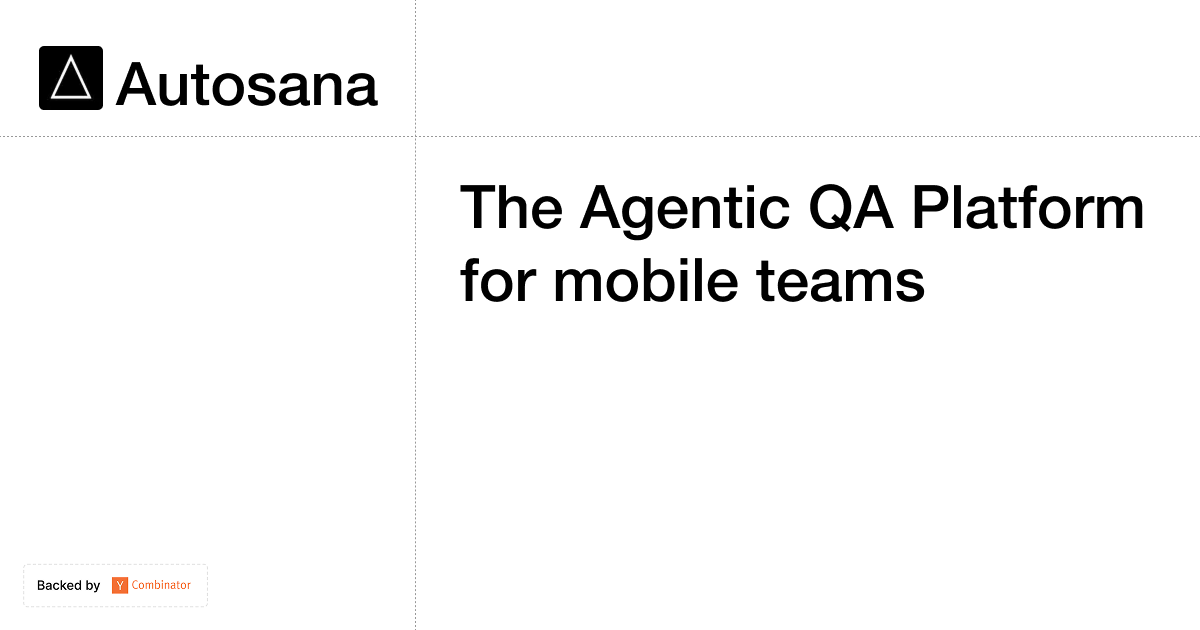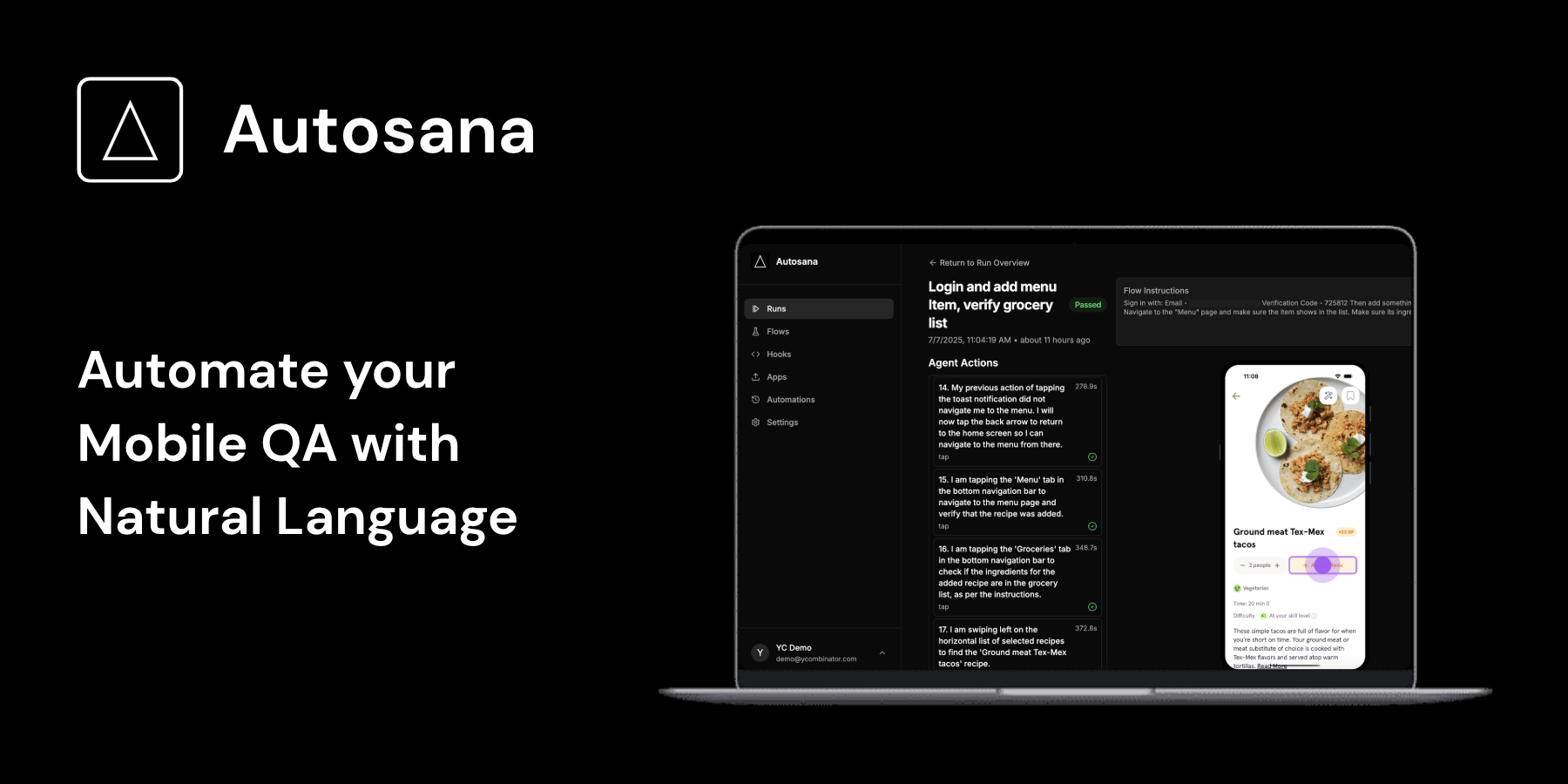
Table of Contents
Overview
In the rapidly evolving landscape of mobile application development, quality assurance remains a critical bottleneck that can significantly impact deployment velocity and user satisfaction. Autosana emerges as a specialized AI-powered solution designed specifically to address the unique challenges of mobile app testing through intelligent automation and natural language processing. Founded in 2025 by former Shift Health engineers Jason Steinberg and Yuvan Sundrani, and backed by Y Combinator’s prestigious S25 batch, Autosana represents a new generation of testing tools that eliminate the complexity and brittleness associated with traditional mobile QA approaches.
The platform addresses a fundamental problem in mobile development: the time-consuming, error-prone nature of manual testing and the maintenance overhead of traditional automated test frameworks. By leveraging advanced AI capabilities and natural language processing, Autosana enables teams to create comprehensive end-to-end tests without writing code, while automatically adapting to application changes that would typically break conventional test scripts.
Key Features
Autosana provides a comprehensive suite of AI-driven capabilities designed specifically for modern mobile application testing workflows:
- Natural Language Test Creation: Transform complex testing scenarios into executable tests using plain English descriptions, eliminating the need for specialized scripting knowledge or technical test automation expertise while maintaining comprehensive coverage.
- Self-Healing Test Architecture: Automatically adapt test execution to user interface changes and application updates without manual intervention, significantly reducing the maintenance overhead that typically plagues traditional automated testing frameworks.
- Universal Mobile Framework Support: Seamlessly test applications built with any mobile development framework including React Native, Flutter, Swift, Kotlin, Unity, and Xamarin, providing consistent testing capabilities regardless of underlying technology choices.
- Comprehensive CI/CD Integration: Embed automated testing directly into continuous integration and deployment pipelines with automated build uploads, test execution triggers, and detailed result reporting that integrates with existing development workflows.
- Intelligent Session Recording: Capture complete visual documentation of test execution processes, enabling teams to verify AI agent behavior, debug test failures, and maintain audit trails for quality assurance processes and compliance requirements.
- Advanced Bug Detection and Reporting: Automatically identify application failures, performance issues, and functional regressions with detailed diagnostic information delivered through email and Slack integrations for immediate team notification and response coordination.
- Cloud-Based Scalable Execution: Leverage cloud-hosted testing infrastructure that eliminates the need for complex device management, providing consistent testing environments and unlimited scalability without hardware investment or maintenance overhead.
How It Works
Autosana operates as an intelligent testing agent that bridges the gap between human testing intent and automated execution through sophisticated AI interpretation and adaptation capabilities. Teams begin by uploading their mobile application builds either manually or through automated CI/CD pipeline triggers, establishing the foundation for comprehensive testing coverage.
The platform’s core innovation lies in its natural language processing capabilities, which interpret plain English test descriptions and translate them into executable testing workflows. Users describe desired test scenarios as they would explain them to a human tester, and Autosana’s AI systems automatically generate the appropriate interactions, validations, and assertions required for comprehensive coverage.
During test execution, the platform’s self-healing architecture continuously adapts to application changes, using computer vision and machine learning algorithms to maintain test validity even when user interface elements change positions, styling, or behavior. This approach eliminates the brittle test maintenance cycles that typically consume significant QA resources in traditional automation frameworks.
All testing sessions are comprehensively recorded, providing visual verification of AI agent behavior and detailed diagnostic information when issues are identified. Results are automatically reported through integrated communication channels, ensuring teams receive immediate feedback about application quality and can respond quickly to identified issues.
Use Cases
Autosana serves mobile development teams across diverse industries and organizational structures where quality assurance speed and reliability directly impact business outcomes:
- Enterprise Mobile Development Teams: Enable large-scale organizations to maintain consistent quality standards across multiple mobile applications and development teams while reducing the specialized QA expertise required for comprehensive testing coverage and regulatory compliance.
- Agile Startup Environments: Provide lean development teams with enterprise-grade testing capabilities without the overhead of dedicated QA engineering resources, enabling rapid iteration cycles while maintaining user experience quality and market competitiveness.
- Cross-Platform Mobile Projects: Streamline testing processes for applications targeting both iOS and Android platforms, eliminating the need to maintain separate testing frameworks and reducing the complexity of multi-platform quality assurance workflows.
- Continuous Integration Environments: Enhance DevOps pipelines with automated quality gates that provide immediate feedback on code changes, preventing regression issues from reaching production while maintaining deployment velocity and team productivity.
- Regulated Industry Applications: Support organizations in healthcare, finance, and other compliance-heavy industries with comprehensive testing documentation, audit trails, and quality assurance processes that meet stringent regulatory requirements while enabling innovation.
Advantages and Considerations
Strengths
- Elimination of Technical Barriers: Natural language test creation democratizes quality assurance by enabling non-technical team members to contribute to comprehensive testing coverage without requiring specialized automation programming skills or extensive QA training.
- Adaptive Intelligence: Self-healing test architecture significantly reduces maintenance overhead compared to traditional automation frameworks, automatically adapting to application changes that would typically require manual test script updates and debugging cycles.
- Comprehensive Framework Support: Universal compatibility with all major mobile development platforms eliminates technology constraints and enables consistent testing approaches regardless of underlying application architecture or development team preferences.
- Proven Enterprise Results: Documented case studies demonstrate significant productivity improvements, with organizations achieving 70% test automation coverage in hours rather than weeks while eliminating brittle test script maintenance.
- Scalable Cloud Infrastructure: Cloud-hosted execution eliminates device management complexity and provides unlimited testing capacity without hardware investment, enabling teams to scale testing efforts dynamically based on application requirements.
Limitations and Considerations
- Mobile-Specific Focus: Platform specialization in mobile application testing may limit adoption for organizations requiring comprehensive web application or desktop software testing capabilities within unified quality assurance workflows.
- AI Interpretation Accuracy: While sophisticated, natural language processing may occasionally misinterpret complex test scenarios, requiring iterative refinement and validation to ensure comprehensive coverage of edge cases and nuanced application behavior.
- Cloud Dependency: Cloud-hosted architecture may present challenges for organizations with strict data security requirements or air-gapped development environments that restrict external testing platform integration.
- Investment Considerations: Subscription-based pricing model requires ongoing investment that may impact budget planning for smaller organizations, though typically offset by reduced QA resource requirements and faster deployment cycles.
How Does It Compare? (Updated for 2025)
The AI-powered testing landscape has evolved dramatically, with Autosana competing in a market increasingly dominated by intelligent automation platforms rather than traditional scripting frameworks.
Modern AI Testing Platforms
Mabl provides comprehensive AI-powered testing with excellent web application support and intelligent test maintenance capabilities. While Mabl excels in web testing automation, Autosana’s specialized focus on mobile applications and natural language test creation offers superior capabilities for mobile-first development teams requiring rapid test creation without technical expertise.
Testim offers AI-powered test authoring and maintenance with strong enterprise integration capabilities. Both platforms provide self-healing tests, but Autosana differentiates through its mobile specialization and natural language approach, while Testim focuses more broadly on web applications with traditional test scripting enhanced by AI capabilities.
Functionize leverages machine learning for intelligent test creation and maintenance with advanced natural language processing. While both platforms use AI for test generation, Autosana’s cloud-hosted mobile agent approach provides more specialized mobile testing capabilities, whereas Functionize offers broader cross-platform testing with emphasis on visual testing.
LambdaTest KaneAI provides AI-powered testing with natural language test creation and multi-platform support. Both platforms offer similar natural language capabilities, but Autosana’s mobile specialization and self-healing architecture provide advantages for mobile-focused teams, while KaneAI offers broader platform coverage including web applications.
Traditional Testing Framework Evolution
Selenium with AI Enhancements continues serving organizations requiring broad browser support and extensive customization capabilities. While Selenium provides maximum flexibility and control, Autosana eliminates the complexity and maintenance overhead through intelligent automation, appealing to teams prioritizing speed and accessibility over granular control.
Cypress with Modern Capabilities offers excellent developer experience for web application testing with modern JavaScript frameworks. While Cypress excels in web testing speed and developer productivity, Autosana addresses the mobile testing gap with specialized capabilities that Cypress cannot match in native mobile environments.
Appium for Native Mobile Testing remains the standard for organizations requiring comprehensive device testing across multiple platforms and configurations. While Appium provides deeper device integration and testing capabilities, Autosana’s cloud-based approach eliminates device management complexity and reduces technical barriers for teams prioritizing rapid testing deployment.
Enterprise AI Testing Solutions
Tricentis Tosca provides comprehensive enterprise testing with AI-powered capabilities and extensive integration options. While Tosca offers broader testing capabilities across multiple application types, Autosana’s specialized mobile focus and natural language approach provide superior accessibility and speed for mobile development teams.
TestGrid CoTester offers AI-powered testing with natural language capabilities similar to Autosana. Both platforms provide comparable natural language test creation, but Autosana’s mobile specialization and self-healing architecture offer advantages for mobile-focused organizations, while TestGrid provides broader web application testing capabilities.
Market Positioning and Strategic Value
Autosana occupies a unique position in the testing ecosystem by combining mobile specialization with advanced AI capabilities and natural language accessibility. This positioning appeals particularly to organizations where mobile application quality directly impacts business outcomes and where traditional QA approaches create bottlenecks in deployment velocity.
The platform’s focus on eliminating technical barriers while maintaining enterprise-grade capabilities addresses a critical gap in the market, enabling organizations to democratize quality assurance without sacrificing testing comprehensiveness or reliability.
Final Thoughts
Autosana represents a significant evolution in mobile application testing, successfully addressing the critical challenges of complexity, maintenance overhead, and accessibility that have traditionally limited the effectiveness of automated quality assurance. The platform’s combination of natural language test creation, self-healing architecture, and mobile specialization creates compelling value for organizations seeking to accelerate deployment cycles without compromising application quality.
The documented success at organizations like Lucra, where 70% test automation was achieved in under 15 hours, demonstrates the platform’s practical impact on development velocity and team productivity. This level of rapid deployment, combined with the elimination of brittle test maintenance cycles, positions Autosana as a transformative solution for mobile-first development environments.
For organizations prioritizing mobile application quality, seeking to reduce QA bottlenecks, or looking to democratize testing capabilities across technical and non-technical team members, Autosana offers compelling advantages over traditional automation frameworks. The platform’s Y Combinator backing and founding team’s proven experience in healthcare technology development provide additional confidence in its long-term viability and continued innovation.
As mobile applications continue driving digital transformation across industries, specialized testing solutions like Autosana become increasingly valuable for maintaining competitive advantage through superior user experiences and rapid market responsiveness. Organizations investing in modern AI-powered testing infrastructure will find Autosana provides the specialized capabilities necessary to excel in mobile-first development environments.

